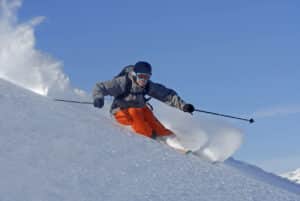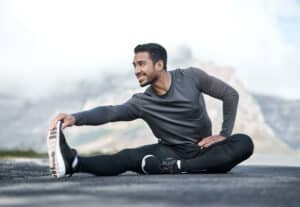 ☰ Menu
☰ Menu
Winter is just around the corner and pretty soon, Colorado’s world-class ski resorts will be open again. The close proximity to great skiing is one of the primary reasons many people choose to live in Colorado. While skiing is an exhilarating activity and a great source of exercise during the winter months, it’s important to prepare your body for the rigors of the sport prior to hitting the slopes.
Skiing is a strenuous activity that involves muscle groups throughout your body. It requires upper and lower body strength, core strength, cardio endurance, and flexibility. When you’re not in shape for skiing, it’s not as much fun:
But there’s an even more important reason you need to train for ski season. Being in ski shape will significantly reduce your risk of sports injuries on the slopes. When your muscles become fatigued, you’re more likely to catch an edge and take a devastating fall that could result in torn ligaments, broken bones and other serious orthopedic injuries. The better shape you’re in, the better you’ll be able to navigate the physical demands of skiing without getting injured.

As with all other fitness training, it’s best to gradually ramp up your efforts as your body becomes stronger. During the first few weeks of your preseason skiing workouts, start out slow and do whatever your body can handle. Even if you’re only able to do a 20–30-minute workout a few days a week, it will begin toning your muscles. You’ll find that after a few weeks, you’re able to work out more frequently, for longer periods of time, and you’ll be able to handle more rigorous workouts.
In order to ski at peak performance levels all day and reduce your risk of a skiing injury, your preseason workouts should focus on the following elements:
Skiing is great exercise because it uses all of your muscle groups. Therefore, your strength training should focus on all the key muscle groups used in skiing.
Lower Body

To strengthen your quads, make sure your workouts include:
Exercises to work your hamstrings and glutes include:
Thigh strength is important as well, and your workouts should include:
Finally, make sure to target your calf muscles with:
Upper Body
Your arm muscles play an important role in skiing as well. They’re responsible for helping you push off with your poles and stabilizing your shoulder joints while you’re turning. The following exercises will help ensure you have the upper body strength required of skiing:
Abdominal/Core Strength

Skiing can be a strenuous cardiovascular workout, especially on powder days where you have to navigate deep snow. Without the proper cardio training, you’ll struggle to have the endurance necessary to ski long runs or make it through a full day on the slopes. The fatigue that sets in when your body lacks the proper cardio fitness can significantly increase your risk of injuries. In fact, the most common time of the day for ski injuries is late afternoon when many skiers are reaching the point of total fatigue.
To make sure you have the proper endurance necessary to ski a full day, make sure your workout routine includes a significant cardiovascular exercise component. Great cardio workouts to prepare for skiing include:

Balance training can also be done using devices such as an exercise ball, BOSU ball, wobble board or balance disc.
You can implement a stretching routine to improve your flexibility. Good stretches to improve your flexibility for skiing include:
If you prefer to combine your balance and flexibility efforts into a single workout, try yoga. Doing a yoga workout twice a week will pay huge dividends when you hit the slopes this winter.
Even if you implement a comprehensive ski fitness routine that gets you in great shape prior to the start of ski season, there’s always a risk that you’ll suffer an injury on the slopes. If you suffer an orthopedic or sports injury while skiing, Colorado Advanced Orthopedics can help you regain full function and restore a pain free life.
Our team includes some of the most experienced board certified and fellowship trained orthopedic surgeons in the state. Due to our location in the Rocky Mountains, our surgeons have extensive experience treating a wide range of ski injuries and are current on the latest techniques that will deliver the best surgical outcomes. In addition, our orthopedics team is supported by a team of sports medicine doctors who administer minimally invasive, nonsurgical treatments and assist with your rehab after surgery.
You’ll also benefit from our in-house physical therapy team, allowing you to complete all your rehab at our facility. Our physical therapists work closely with our orthopedics and sports medicine doctors, ensuring everyone on your care team remains completely aligned during every stage of the process. At Colorado Advanced Orthopedics, we’re committed to delivering exceptional care that will get you back to enjoying your favorite activities as soon as possible.
Contact us today to schedule an appointment. Colorado Advanced Orthopedics serves patients in Meeker and throughout the White River Valley.
Subscribe to our monthly newsletter for the latest tips and insights on orthopedic health, wellness, and recovery. Discover how to celebrate life to the fullest!
Subscribe To Our Monthly Publication